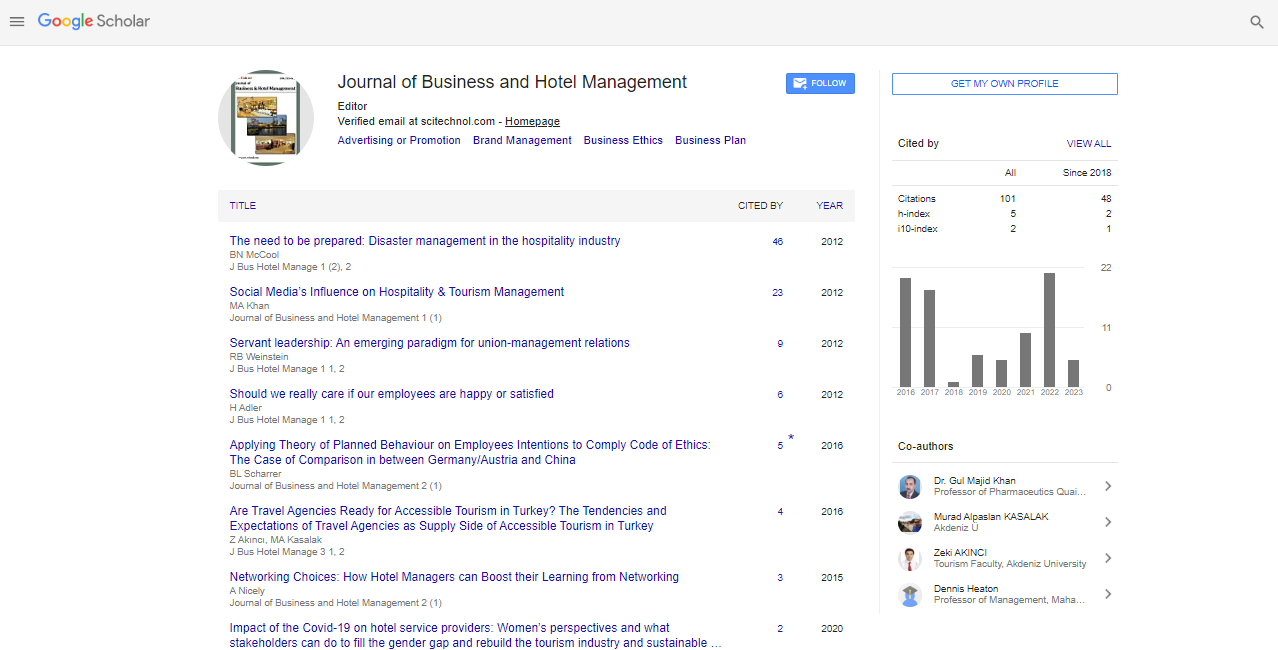Opinion Article, Jbhm Vol: 9 Issue: 3
The Role of Food and Beverage Management in Hotel Success
Nealon E Adams*
Department of Hotel Management, University of Houston, University Drive, Houston, USA
*Corresponding Author: Nealon E Adams
Department of Hotel Management,
University of Houston, University Drive, Houston, USA
E-mail: Adamselon22@gmail.com
Received date: 28 August, 2023, Manuscript No. JBHM-23-117771;
Editor assigned date: 30 August, 2023, PreQC No. JBHM-23-117771 (PQ);
Reviewed date: 13 September, 2023, QC No. JBHM-23-117771;
Revised date: 21 September, 2023, Manuscript No. JBHM-23-117771 (R);
Published date: 29 September, 2023, DOI: 10.4172/2324-9129.1000148
Citation: Adams NE (2023) The Role of Food and Beverage Management in Hotel Success. JBHM 9:3.
Description
In the bustling world of hospitality, food and beverage management stands as a cornerstone of guest satisfaction. In hotels, where comfort, luxury, and exceptional service are paramount, the management of culinary experiences takes center stage. This essay explores the nuanced world of food and beverage management in hotels, delving into its pivotal role in shaping guest experiences, fostering culinary creativity, ensuring operational efficiency, and contributing to the hotel's overall success.
Crafting memorable culinary journeys
Food is a universal language, and in hotels, it becomes a means to communicate the essence of the locale. Food and beverage managers curate menus that reflect the hotel's identity and the regional flavors. Whether it's a fusion of international cuisines or a showcase of local delicacies, these menus are meticulously crafted to offer guests a taste of the destination. Through innovative dishes and expertly paired beverages, hotels create memorable culinary journeys that leave a lasting impression on their guests.
Ensuring guest satisfaction
Guest satisfaction is the ultimate goal of food and beverage management. From the ambiance of the restaurant to the presentation of dishes and the professionalism of the staff, every aspect is carefully orchestrated. Food and beverage managers collaborate closely with chefs, sommeliers, and service staff to maintain high standards. By actively seeking feedback and adapting to guest preferences, hotels can continually enhance their offerings, ensuring that each meal is not just a dining experience but a delightful adventure.
Operational efficiency and cost control
Behind the scenes, food and beverage managers are responsible for ensuring operational efficiency. They streamline processes in the kitchen, optimize inventory management, and monitor costs without compromising on quality. By implementing efficient systems, they reduce wastage, enhance productivity, and maintain profitability. This delicate balance between quality and cost is a testament to the managerial acumen of food and beverage professionals in hotels.
Nurturing culinary creativity
In the realm of hotels, food and beverage management is also about fostering creativity among culinary teams. Chefs are encouraged to experiment with ingredients, techniques, and presentation styles to create dishes that are not only visually appealing but also tantalizing to the taste buds. Food and beverage managers provide the necessary support and resources, allowing chefs to push boundaries and offer guests innovative gastronomic experiences. This creativity not only sets the hotel apart but also contributes to the evolution of culinary arts.
Catering to special dietary needs
In the modern era, diversity in dietary preferences and restrictions is a common challenge faced by food and beverage managers. Hotels are expected to accommodate various dietary needs, including vegetarian, vegan, gluten-free, and allergen-specific diets. Food and beverage managers collaborate with chefs to design inclusive menus that cater to all guests. This inclusive approach ensures that every guest, regardless of their dietary requirements, enjoys a satisfying and memorable dining experience.
Conclusion
In conclusion, food and beverage management in hotels is a delicate blend of artistry, innovation, efficiency, and guest-centricity. It is a symphony where the ingredients are not just culinary delights but also the passions and skills of dedicated professionals. From the kitchen to the dining table, food and beverage managers orchestrate experiences that tantalize the senses and leave a lasting imprint on the memory of guests. Their ability to seamlessly marry creativity with efficiency, and guest satisfaction with operational rigor, defines the success of a hotel's culinary offerings. In the grand tapestry of hospitality, food and beverage management emerges as a vibrant thread, weaving together flavors, cultures, and experiences, creating a rich and satisfying narrative for every guest who walks through the hotel's doors.
 Spanish
Spanish  Chinese
Chinese  Russian
Russian  German
German  French
French  Japanese
Japanese  Portuguese
Portuguese  Hindi
Hindi 